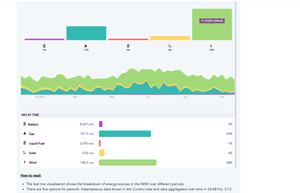
octave
Members-
Posts
4,009 -
Joined
-
Last visited
-
Days Won
40
Content Type
Profiles
Forums
Gallery
Downloads
Blogs
Events
Our Shop
Movies
Everything posted by octave
-
I can confirm that I am both alive and well. I have been popping in for a look around, but I don't think I have signed in lately. I do tend to drift in and out. I did send Spacey a private message a couple of weeks ago to see if he was ok, but no answer.
-
Also, @spacesailorhas been absent for a few weeks
-
There are many trials of agrivoltaics going on in Australia and overseas. I My assumption is that with all these trials going on and some already operating agrivolatic farms that things like the stock damaging the accuators or other parts is a known quantity. I am sure it would not suit every farm type or location, but a search of the net does show sheep and cattle and crops (mainly veges and grape vines, etc where partial shade is preferable.
-
I am quite settled. In terms of asking questions, usually the answer is freely available. For example, off the top of my head, I did not know if wind turbine blades contained asbestos. It is not something I had heard, so I sought out the answer. Perhaps I should have said "people instead" of "you" to make it more general and less personal. There is a common trend to only question the new, whilst ignoring the problems of the old. Yesterday, in my local area, a car burst into flames. There was a flurry of comments about EVs being unsafe, or "I would never drive one of those things" As it turns out, the vehicle was a petrol Hyundai. As soon as this was established, the outrage and concern evaporated.
-
not in the turbine blades; however, some components are found in turbine brake pads. There have been concerns with wind turbine blades in the past; however, new blades are recyclable. Do you also question what parts of coal power stations are recycled and what is left over when the coal is burnt ? https://www.siemensgamesa.com/global/en/home/explore/journal/recyclable-blade.html Acuators? I am not sure exactly what you are referring to. There is no shortage of videos and even long seminars on the net. I will happily post links. Also, a search of farms al; already using agrivoltaics will show many examples both here and overseas. There are loads of examples both here and overseas. Here are just 2, but do a search yourself. This is a win-win situation. Change can be hard, but it is necessary
-
It is early days, but I believe there are a few. Farming has always been a tough way of earning a living. A farmer must decide what they will farm to stay profitable. They can be at the whims of world markets. What better way to diversify than to host renewable power projects? This is drought-proofing a farm.
-
I was not necessarily suggesting the most likely scenario, only suggesting that in SkyNews' world, only one of these causes would whip them up into a frenzy. As for arson being unlikely, I am not sure about that. It is within the realms of possibility, especially with anti-renewable sentiment. It is quite likely that this fire may have been caused by the solar farm or associated equipment. Power lines, whether they are connected to solar or not, are a major cause of fire. Much of the technical equipment we use is capable of catching fire. When this does happen, we analyse and take measures to reduce the likelihood of it happening again.
-
Fires on farms are not unusual. The source could have been from farm equipment, natural sources, arson or from the solar farm. Let's say it was from the solar farm; this surely only means analysis and actions to make it less likely to happen in the future. Here is a question: Did the incident below make Skynews? No, it did not. This happened a few weeks ago, not far from where I live. There were numerous comments online from conservative folks suggesting that this is a normal process, and sometimes the stack does get smoky for a time. Whether it was normal or not, it did start a grass fire, which required the fire brigade to attend. A grass fire near an oil refinery ought to be big news. There seems to be a discount applied to existing technologies as opposed to newer ones. A petrol or diesel car catches fire, and it is not a big story. An EV catches fire, and it is huge news and has people suggesting that this technology should not exist.
-
Exactly. I travel on the train often, but those who drive their cars instead do benefit from all the travellers who are on the train and not clogging up the roads.
-
As I have said previously, I am not philosophically opposed to nuclear, but amongst other things, an economic case would need to be presented. The other issue is the timeline on nuclear. I get that SMRs are being developed and even a couple are in operation now (Russia and China). How long would it take for us to develop the expertise to build our own, or do we get in the queue to buy one from the Russians, the Chinese or the US?. Until these nuclear options are available and built do we spend money on refurbishing old coal or building new coal? All of the scenarios would result in bigger power bills. Your link that talks about a "death spiral" and lumps Australia in with Pakistan, I think, is inaccurate. Pakistan’s grid is in trouble because of long-term under-investment, big subsidies, high losses and widespread non-payment. That’s not a rooftop solar problem. Australia doesn’t have those structural issues, and we actually plan our grid developments years in advance through AEMO and the ISP. You did tell me I could not use Denmark as an example because Australia is not Denmark. You know what else it is not Australia? Pakistan And in fact, pretty much need to run 24 hours a day. Coal can be somewhat throttled back, you can't really stop burning fuel when demand is low. It is a bit like keeping your car idling in for when you need to go out. Would this be different with the cost of developing and building nuclear? The predictions of death spirals and the grid falling over are not new. I recall dire warnings that if we had more than 20% renerwables on the grid. The yardstick keeps being moved. When wll th grid fall over (other than the usual faults)? I dont say that all this is easy (neither is building NP) problems are being solved all the time. Just because we have relied on inertia from coal generators it does not mean that thius is the end point of technological development. We have more and more batteries and grid forming inverters, synchronous condensors etc.
-
Whatever way we go, there are costs. Do you really think that building nuclear power plants will not impact your bill?
-
The electric hot water that is installed now is generally not the old-fashioned resistive hot water system, but heat pump hot water systems. These systems are very energy efficient compared to resistive electric or gas. I believe there are substantial rebates for upgrading to a heat pump, so probably worth looking into.
-
The cost of electricity comprises direct generation costs plus the infrastructure required to distribute it and retail costs. Electricity could be extremely cheap if we decided not to extend the grid or if we reduced maintenance standards. We could decide what level of resilience we are willing to pay for. Do you think building new coal, gas, or nuclear power would reduce your bills? Would we pay through higher power bills or through our taxes? The Iberian Peninsula power cut is very complex. As the video you posted suggests, there were many failings. Even if the chain of events were precipitated by a component of the renewable system (and I don't think that is universally accepted) do we say "Oh, a failure, let's rip out the renewables and build more coal"? I think a better course of action would be to say "what went wrong and how we can prevent it from happening again." If your car breaks down, you don't swap it for a horse, even though horses were adequate transport back in the day. I imagine neither of us will suddenly change our minds, and the move towards renewables is not likely to stop and be reversed. When I post, I spend considerable time making sure my posts can be supported by references. This makes this a time-consuming activity. I think I might schedule a reminder email to myself, and I could gather as many stats of, let's say June and December (to capture high and low solar) and look for records of grid failures and see if there is a trend and if so, in what direction. Could also record price, both spot and retail (as well as daily connection charges)
-
Here is a graph of the energy mix for SA for last year. To perhaps oversimplify the argument somewhat. Some people appear to want the green, orange and purple (wind and solar) or in other words, the methods of generation that do not require fuel to be transported and burned, but would rather the teal colour to be 3 times higher. As I see it, the objections to producing electricity without transporting or burning fuel are reliability and cost. On reliability, I can't really find evidence that states with more renewables have a less reliable grid. I do have a basic understanding of maintaining grid frequency. This is why synchronous condensors, grid forming inverters and batteries are being installed. Siso I have open in front of me here a report on the Spanish power cut. Grid Incident in Spain Portugal on 28 April 2025 Excess renewables generation did not cause Iberian blackout Of course, the grid is an extremely complex thing, and from time to time, things can go wrong. It seems to me, though, that solving those problems has to be a better solution than going back to the old system of just coal and gas. Of course, coal and gas is not perfect in terms of reliability. In terms of cost, according to AEOMO, th ten-year forecast is for prices to drop (not dramatically). In fact wholesale prices are lower in SA. Yes, this doesn't translate into retail prices yet. Sometimes you have to spend money to save money. When I bought my solar I added the loan montly payment to my monthly electricity bill. This made my electricity quite expensive for 4.5 years but now it is extremely cheap. Like it or not the world is moving towards more and more renewables. Businesses are making investment choices.
-
Americanism over riding Aus, why don't people care.
octave replied to randomx's topic in General Discussion
Whether or not you approve of the term "nation of migrants," these are the hard, rational facts. As of 2023, 31% of Australians were born overseas. The 2021 census shows that nearly half (48%) of Australians have a parent born overseas. Let's leave out the term "Nation of Migrants" if it freaks you out. Let's just say a nation with a significant number of migrants. -
The comparison with Qantas aircraft is misleading, because traditional coal-fired power stations already rely on vast amounts of underutilised equipment. Coal plants cannot ramp quickly, they cannot turn off at night, and they must run even when demand collapses — meaning the whole plant is burning fuel simply to stay online. This is the definition of expensive underutilisation.
-
Americanism over riding Aus, why don't people care.
octave replied to randomx's topic in General Discussion
We moved to a country town in 1990 and lived there until 2011. It was an interesting place to live with a healthy mix of traditional farmers, etc., and people like us (tree change folks). When we moved there, we were worried that it it be a redneck town; however, this was not the case. There were a few redneckish types on one end of the scale and a few dropout hippies on the other side. The town was quite cohesive, not that everyone shared the politics or life philosophies, but there was quite a mutual respect for "differences" The town remained vibrant, and it still is. Rather than being in decline like so many country towns, this place thrived, attracting artists, musicians, craftspeople, etc. An interesting point regarding immigration, there was a large Chinese family called the Nomchong family. They owned several businesses around town. This family came to the town (Braidwood) in 1860. Throughout the years, they had all married other Chinese people, so they looked very Chinese, but all had the broadest Australian accents. The owner of the local electrical appliance shop was Bob Nomchong, and within the family, there was a Betty and an Eileen. Amongst the younger generations, there was a Kylie, etc. The strange thing is if I were standing next to one of the Nomchong family, I would be judged as the Aussie, and they would be assumed to be the immigrant rather than the 5th Australians https://www.cmag.com.au/exhibitions/nomchong-family -
EV Sales up 24 Per Cent in First Half of 2025 EV and hybrid sales soar in Australia as internal combustion cars fall below 70% market share for first time
-
Americanism over riding Aus, why don't people care.
octave replied to randomx's topic in General Discussion
Randomx, what exactly do you want to happen? I don't totally disagree with you, although I would not put the argument so aggressively. I passed someone while bush I said Hi and they, obviously being a Kiwi, said Kia Ora, which I think was quite charming. -
Obviously, to arrive at a meaningful figure, you need to average data over time. A single spot measurement—say, 13th June 2024 at 13:10—is just a snapshot. It shows how the grid was powered at that moment, using batteries, hydro, or fossil fuels. Fossil fuels still play a role, though their contribution is declining year by year. You mentioned that Australia has only 7% traditional hydro and is unlikely to get more. I have to admit, I was surprised to learn that several new pumped hydro projects are under construction or in planning—not just Snowy 2.0. As well, there are larger projects like the Australia-Asia Power Link. Yes, I am aware that it had a setback, but it is back. The plan is to start with a more modest link from Powel creek before the eventual connection to Singapore. Yep, ambitious and difficult, but technically feasible. I understand that the biggest challenges might be financial. This is not the only project of this magnitude in the planning stage (Morocco-UK 400km) We can push the bounds of technology, or we can just throw another lump of coal on the fire. We could debate the details endlessly, but in the meantime, solar panels, wind turbines, batteries, and other renewables are getting cheaper and more efficient. The grid is being upgraded, home battery adoption is growing, and EVs are becoming more common—many with vehicle-to-grid capabilities. You said earlier that you thought pursuing further renewables was criminal, and you wish the government could be sued (I hope I am not misquoting you). Perhaps you should assemble like-minded people and explore doing just that.
-
OK, but I have trouble following your logic. You hate political parties, and therefore, I assume, the government. You stick it to them by not voting (which they would hardly notice), and you get a fine, which you pay to whom? THE GOVERNMENT. Personally, I want to spend my money on things that make me happy, not send it to the government. Perhaps a strongly worded letter might be more cost-effective.
-
My son has this sticker on his 2019 Tesla.
-
I have just been digging around in the Battery capacity stats. Residential (3.6 GWh) + Business (0.5–1.0 GWh) + Grid (6–12 GWh) → ~10.2 GWh to ~16.6 GWh operational mid-2025 (range reflects uncertainty in business & grid totals). Committed / near-term additional capacity (next 1–3 years): Under construction (end-2024): 23.3 GWh (utility). Clean Energy Council At/near financial close (pipeline): 37 GWh (Rystad — larger pipeline beyond those under construction). pv magazine International If the under-construction + near-financial-close projects all proceed, Australia’s total installed (homes + business + utility) could reach dozens of GWh (40–70 GWh) within a few years. Also, the 410000 EVs (approx) in Australia at the moment have a combined capacity of 30GWh. Vehicle-to-grid is now happening, albeit small at the moment. I think those countries that embrace technological innovation will thrive.
-
Republican efforts to restrict voting following the 2020 United States presidential election
-
And how is that working out for you? Poor voting turnout does not stick it to the pollies. Most countries don't have compulsory voting and have low turnouts, but so what? Willingly paying fines when you say you are struggling to pay your power bills seems like cutting off your nose to spite your face. How does not voting achieve anything?







